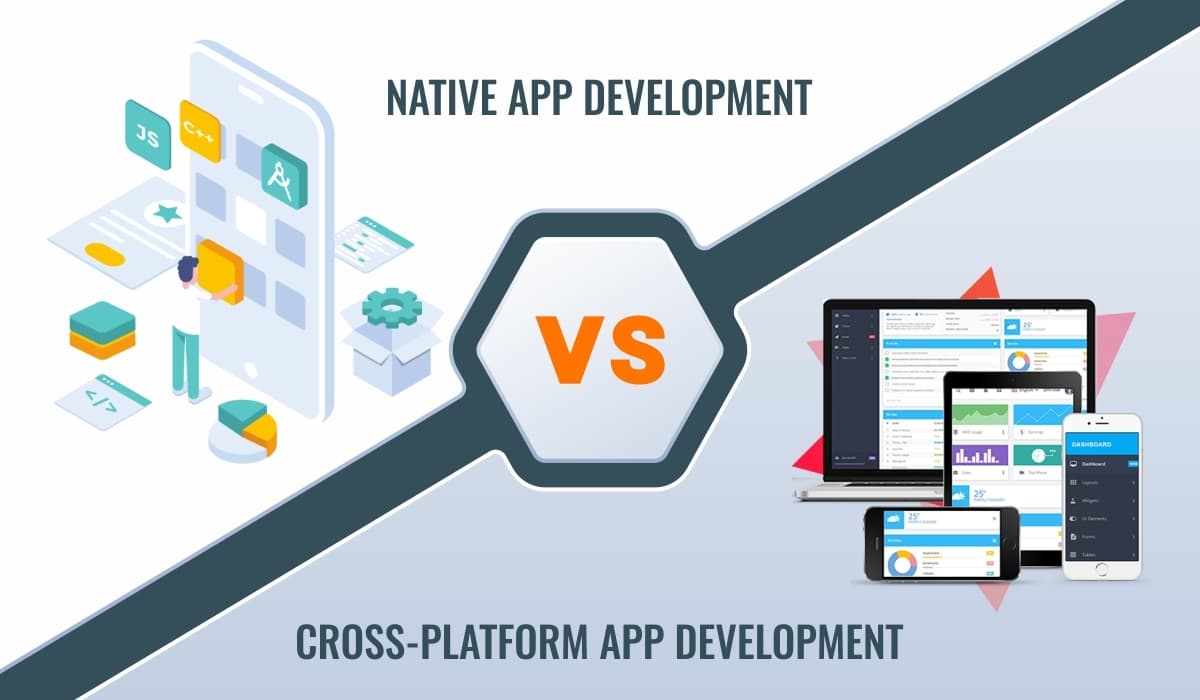The mobile app industry worldwide has undergone some major changes in the past few years. In 2017, Android and iOS, the two most popular operating systems used for smartphones, held a market share of 85.1% and 14.8%, respectively.
As of March 2018, there were 3.8 million Android apps in Google Play and 2 million iOS apps in Apple’s App Store.
With so much mobile app demand, programmers are having to work out new ways to stay one step ahead of the game. They’re searching for tools to cross the iOS-Android divide and provide exceptional performance, easy navigation, and great visual appeal that mobile app users usually demand. This is why cross-platform options are getting popular and functional.
Most development companies now utilize mobile apps as a platform for raising brand awareness, not a business of their own. With the increasing adoption of AI solutions (namely chatbots, smart wallets, messengers, etc.) experts even start to discuss mobile apps’ future!
Amid the controversy and chaos, the “native vs. cross-platform” mobile app development topic is very popular nowadays.
Let’s get into a talk about the differences between native and cross-platform applications.
Native app development
Native applications are developed using platform-specific programming languages. For example, some programming languages that can be utilized for developing Android apps include Java, Kotlin. Objective-C and Swift are the languages used for the iOS mobile operating system.
The native apps are developed specifically to be run on the target platform — with the support of all the native technologies and other hardware components such as camera and calendar.
Advantages of Native mobile apps
Since the technologies utilized in developing native applications are platform-specific, the native code experiences direct access to the host’s operating system and functionalities.
This exceptional interaction with the native features of the mobile devices provides the high performance of the application, especially when rendering graphics or multimedia content.
Therefore, developing complex applications using native code could decrease the risks of downtimes from crashes or freezes.
Since native apps integrate with the mobile operating system efficiently, customers are able to navigate a familiar interface without many problems, resulting in high user experiences (UX) and repeated use.
- Better positioning on app stores
The quality of user experience is an essential rating standard in the app stores. If an app has a good rating, it can be ranked highly, leading to higher visibility and increased profits. And, native apps are usually positioned higher on the app stores because of their exceptional performance and ease-of-use.
Cross-platform app development
Cross-platform applications can run on a variety of operating systems. After creating the application’s code, it can be deployed on different devices and platforms without any issue. It’s an all-in-one approach that is popularly used to improve efficiency and save money.
Advantages of cross-platform apps
Cross-platform app developers do not need to have knowledge of multiple technologies before developing their apps; they need to master a few and set the ball rolling.
Since there is no requirement of creating different codebases, the initial deployment on the platforms is much faster.
Furthermore, future changes to the application can be done simultaneously without making changes individually.
- Affordable and time saver
It provides portability that allows programmers to utilize a single code on different platforms, which greatly reduces prices and development time — unlike native apps.
Developing cross-platform apps provides access to a larger number of users, which could lead to increased revenues.
Different cross-platform mobile development technologies
There are some technologies that are used for cross platforms. Here are the popular ones:
React Native is a Javascript framework to develop native mobile apps for iOS and Android. You can create mobile applications identical to an application developed using Swift for iOS or Java for Android. RavStack’s React Native developers develop cross-platform apps that are functionally powerful and provide an exceptional user experience.
Flutter is an open-source, cross-platform app development framework introduced by Google. Ever since its invention, Google has kept enhancing this super-excellent framework. With our Flutter mobile app development services, our highly skilled developers develop fast, reliable, and robust Android and iOS mobile apps.
PhoneGap application development is an award-winning framework and is based on distributed systems technologies and web shortcuts. It lets developers access the latest hardware components.
Ionic is one of the best frameworks in today’s times. Ionic application development provides compelling functions to create high performing apps and cross-platform mobile applications with the advantage of the look and feel of native apps.
Apache Cordova includes HTML5, CSS3, and JavaScript. It provides access to the mobile device’s accelerometer, contact data, file storage, GPS, notifications, and media. It has some advantages, including simple API and the ability to utilize any JS framework
It is one of the most widely used app development platforms by organizations. It helps develop native cross-platform applications with 75% code sharing across Android and iOS. Xamarin Developers use C# to develop apps. Xamarin enables programmers to run automated tests for mobile apps and monitor app performance.
Choosing between native and cross-platform applications
Sometimes it is difficult to choose between native or cross-platform app development. Native applications win on specific plus points such as high-performance while cross-platform applications are preferred on particular aspects such as savings on time and money.
However, let’s not forget that the choice completely depends upon your application. Simple applications like games and content distribution apps are usually built as a cross-platform app while apps with specific functionalities are native.
Ultimately, you should choose the platform that works best for your development needs and ensures you attain the objectives of your application development efforts.
What makes RavStack – The leading mobile app development company?
Being the best provider of both native and cross-platform mobile apps development services, we have international clients who outsource work to us. Our clients love how we always strive to fulfill their core requirements. Here’s what differentiates us from the rest:
- We use multiple platforms and achieve expertise at them all
- A renowned provider of cost-effective services
- We use project management tools like Agile to offer prompt results
- Our developers have a great experience in developing native as well as cross-platform apps.
Request a callback from our mobile app consultants and start your digital journey.
Get in touch with our expert developers & consultants
We'll get back to you within 24 hours
Talk to our expert

 September 16, 2020
September 16, 2020
 11 mins read
11 mins read
 +1 415 800 4089
+1 415 800 4089 info@ravtsack.com
info@ravtsack.com






 July 8, 2020
July 8, 2020 7 mins read
7 mins read



)




